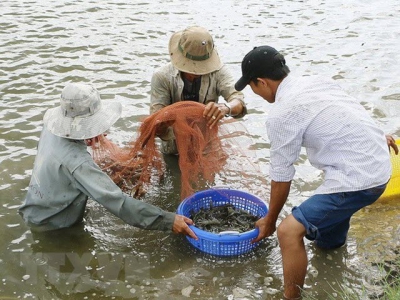Ben Tre: Shrimp to become spearhead of production industry

The Mekong Delta province of Ben Tre targets earnings from shrimp export to rise to 53 million USD by 2025. (Photo: VNA)
Ben Tre (VNA) – The Mekong Delta province of Ben Tre will be developing its shrimp sector’s value chain with intensive farming and advanced technological application, aiming to make it the spearhead of the locality’s industrial production sector by 2025, according to Vice Chairman of the provincial People’s Committee Nguyen Huu Lap.
Under a recently issued action plan, costing over 2.6 trillion VND (111.8 million USD), the province will promote the value-chain development of the shrimp industry during 2018-2020. Some 36,800ha will be zoned off for shrimp cultivation, including 35,000ha for brackish shrimp and 1,800ha for giant river prawn.
Total shrimp output for the period is expected to hit 62,810 tonnes, and export revenue is forecast at 30 million USD.
High technologies will be applied in extensive shrimp farming, shrimp-rice farming, and shrimp-forest farming models in the province during 2020-2025. The locality predicts shrimp cultivation to increase to 37,420ha, with earnings from export to rise to 53 million USD.
The province has already set up large-scale eco-shrimp farming models in the districts of Ba Tri, Binh Dai, and Thach Phu. It is also calling for investment in three shrimp processing plants during the 2020-2025 period.
Lap said that to realise its set goals, comprehensive measures must be carried out, including in infrastructure development, science and technology development, and investment promotion.
Besides branching out cooperatives to form large material production areas, the province has turned production zones with low proficiencies into specialised aquaculture facilities, which are in line with local planning and have close connections with processing and consuming processes.
Ben Tre will prioritise infrastructure projects, especially investment in irrigational systems in farming areas that apply high technologies.
Furthermore, it will join hands with universities and institutes to study new technologies which are suitable for material production (fry, foodstuff, and equipment), farming, processing, preservation, and consumption.
The province is currently home to some 35,000ha of shrimp farms, which yield more than 50,000 tonnes per year.
Related news
 Testing low-cost demand carp feeders in Nepal
Testing low-cost demand carp feeders in Nepal Results of a study in Nepal using low-cost demand feeders for farmed carp production demonstrated the potential of this simple technology to help Nepalese fish
 Mekong Delta urged to apply hi-tech in fish farming
Mekong Delta urged to apply hi-tech in fish farming The seminar was held to review the production and consumption of catfish and implementation of the high-quality pangasius breeding project.
 Polychaete worms reduce waste, provide food in aquaculture
Polychaete worms reduce waste, provide food in aquaculture The marine polychaete Nereis diversicolor can be integrated into recirculating aquaculture systems to reduce particulate matter.